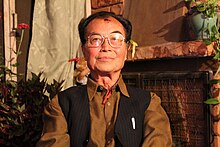Marshall Julum Shakya
This article includes a list of general references, but it lacks sufficient corresponding inline citations. (July 2015) |
Marshall Julum Shakya मार्शल जुलुम शाक्य | |
|---|---|
 | |
| Personal details | |
| Born | 3 October 1940 Kathmandu |
| Political party | Nepali Congress |
| Spouse | Shalina Panday Shakya |
| Children | Shivani Shakya |
Marshall Julum Shakya (Template:Lang-ne) is a Nepalese politician, belonging to the Nepali Congress. He is a founder member of Nepal Student Union established in March 1970. He spent 15 years in prison during the panchayat regime. As of 1988, he was the president of the Kathmandu District of Nepali Congress.[1] During the 1990 Jana Andolan he was the convenor of the Central Action Committee of Nepali Congress, and one of the most prominent party leaders not under arrest.[2]
Marshall Julum Shakya was first arrested in December 1960 under the Public Security Act, immediately after King Mahendra staged a coup which removed the democratically-elected government of the Nepali National Congress Party. A founder member and executive committee member of Amnesty International's Nepal Section, Mr Shakya was again in prison from 1961 to 1967, and for one month in 1970. He was re-arrested in May 1973 in connection with a meeting organized by Ram Raja Prasad Singh. Mr Shakya had reportedly been arrested at least nine times under the Public Security Act which provided for detention without charge or trial for up to 3 years. Mr Shakya studied political science at Tribhuvan University, Kathmandu. He took an arts degree in Economics in prison. [3] Altogether he was imprisoned for 14 years and spent 2 years of his life underground in various parts of the country including Kathmandu valley. He was declared Prisoner of Conscience for 3 years while imprisoned in Nakhu Jail by Amnesty International, Ontario Section of Canada.
References
- ^ Human rights violations in Nepal. New York, NY: Asia Watch Committee, Human Rights Watch], 1989. pp. 73-74
- ^ De Jongh, Nicholas. Bedside Guardian. A Selection from the Guardian 1989-90. 39. London: Fourth Estate, 1990. p. 202
- ^ Amnesty International December 1976 Volume VI Number 12, Newsletter
